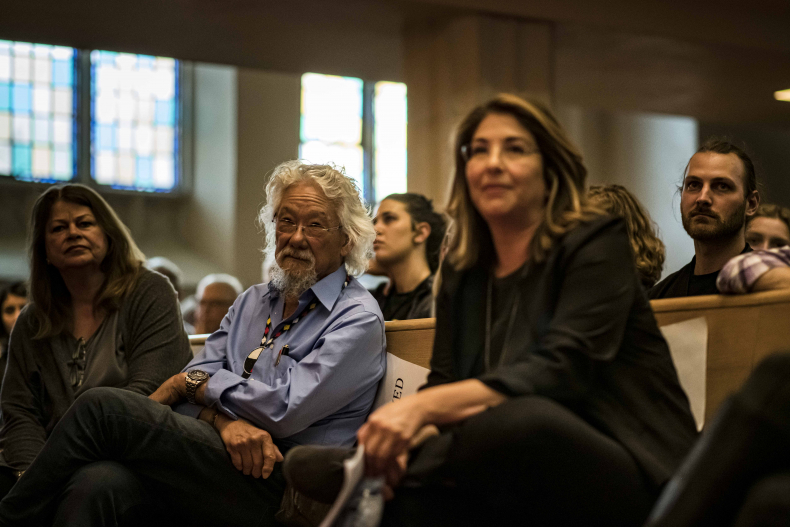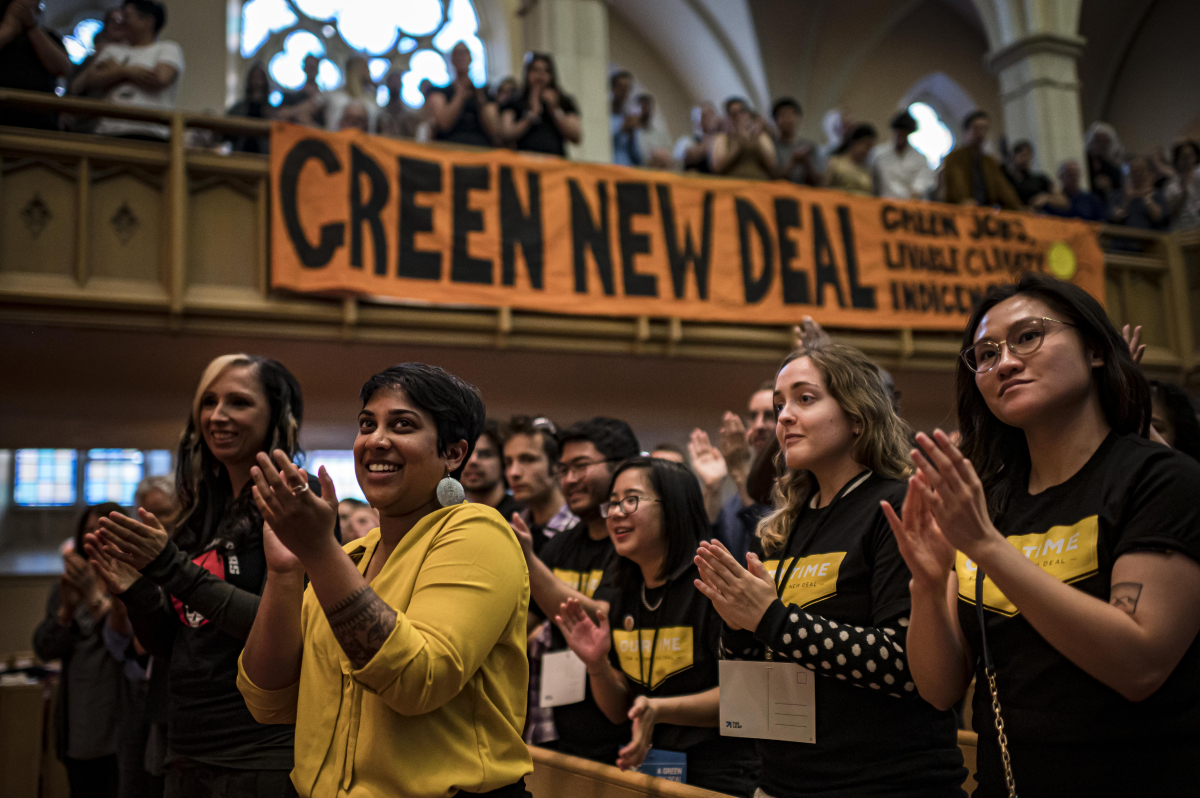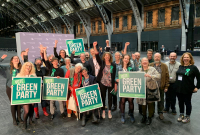Green New Deal tour seeks hope and reconciliation in Canada

Social worker Maria Zak immigrated to Canada from Cape Town, South Africa, where her family lived in poverty and witnessed the Apollo Sea oil spill back in 1994.
It was there that Zak witnessed the convergence of social inequality and environmental degradation. Under the backdrop of systemic poverty, Zak, along with her twin sister, Sasha, helped clean some of the 500 penguins left sick and stranded by the spill. This was her introduction to activism.
That upbringing gave her an intimate view of the effects of climate change and poverty. “It’s different when you can’t leave the problem,” Zak said.
“When you live in it,” she said, “you experience it differently, it becomes part of you. You internalize the problem differently.”
Now married with one son and living in Toronto, Zak said it’s good that there is a movement bringing social and environmental issues together.
“I find a lot of activists are sometimes at odds with climate change activists,” she said. “There are not too many resources, and many times, we have to compete to be noticed. I don’t have much time for climate because I’m so busy with my social-justice stuff, so this was the first time I got an opportunity to do both.”
Zak noticed a difference in the discourse surrounding climate change when she moved to Canada.
“People did not talk about nature or climate much here,” she said.
“Maybe to Canadians, it feels like a lot, but coming from South Africa, you notice the difference. I think Indigenous voices have always spoken about climate, but they are not often included in Canadian discourse. I think respect for First Nations and climate talk go hand-in-hand. If one is silenced, the other is as well.”
She sat with several hundred people who were kicking off a national tour for a Green New Deal at the Bloor Street United Church in Toronto on Tuesday, one of roughly 150 town halls to be held across the country ahead of the federal election.
Building off the momentum of the Green New Deal in the United States, Canadian organizations have adopted a similar premise in preparation for policy discussions that will occur in October.

The Canadian version is adding more emphasis on the inclusion of Indigenous practices.
The Green New Deal “must be based on Indigenous knowledge and science and cut Canada’s emissions in half in 11 years,” according to the Council of Canadians, one of many partnering groups.
The United Nations Intergovernmental Panel on Climate Change (IPCC) released a report last October saying global warming requires “rapid and far-reaching” infrastructure transitions. The UN report, completed by leading climate scientists, warns that without serious action to lower CO2 emissions within 11 years, there will be more catastrophes to come, including floods, droughts, extreme heat and poverty.
Zak noted that the United Nations Declaration on the Rights of Indigenous Peoples (UNDRIP) has not been implemented in Canada, which defines Indigenous rights and grants free prior informed consent to the policies that affect them, such as climate change and natural resource development.
On June 11, the Standing Senate Committee on Aboriginal Peoples passed Bill C-262 to implement UNDRIP in Canada. It is not yet federal law. Conservative senators objected over fears about its potential impact on resource development and have been accused of stalling. If the bill is not made federal law by the end of the month, new legislation will have to be tabled.
The Green New Deal attempts to align the principles of UNDRIP and traditional Indigenous knowledge with scientific inquiry.
Wanda Whitebird, an elder of the Mi'kmaq Nation from Afton, N.S., welcomed the crowd of a few hundred to the inaugural town hall in Toronto.
Large banners calling for 100 per cent renewable energy and the recognition of Indigenous rights were draped from the second floor of the church. From the front pews to the back, attendees chanted for “climate justice.”
“We cannot live without clean water,” Whitebird said.
“We are not doing a good job, because my grandchildren might not have a place to live or your grandchildren might not have a place to live, because without clean water, we are going to die.”
Pam Palmater, a Mi’kmaq lawyer whose family originates from the Eel River Bar First Nation, took to the podium to speak about First Nations that have been affected by the climate crisis.
“Canada is killing our people, and it’s killing the environment,” she said. “It’s as simple as that.”
Palmater was referencing the Truth and Reconciliation Commission (TRC) report and the final report issued by the National Inquiry into Missing and Murdered Indigenous Women and Girls (MMIWG).
The TRC report found that Canada’s residential school system was a form of cultural genocide. The MMIWG report found Canada guilty of a race-based genocide “which has been empowered by colonial structures.”
At the same time, Canada is guilty of ecocide, Palmater said.
“(Canada's government) is making decisions knowing that it is destroying the environment, primarily for corporate profit. Imagine what it’s like for Indigenous people to watch genocide and ecocide happen in our territories and be stopped from protecting everyone in its territory.”
After the event, Palmater explained how traditional Indigenous knowledge is based on thousands of years of understanding how to interact with the environment, down to such details as knowing how many bird eggs should be kept in a nest to protect a species's population from declining. In Indigenous languages, lakes and rivers are named after what you can and can't do with them — for instance, whether a river is too fast to fish.
“We’ve been trying to tell scientists that for years when they developed their own conservation policies, which are far more aggressive and support things like commercial extraction,” Palmater said.
The Green New Deal has been criticized for bringing too many social and environmental issues together, and lacking the focus needed to implement new policy. In response, Palmater pointed to the relationship between missing and murdered Indigenous women and girls and local resource developments.
“(Pipelines and resource developments) involve large numbers of man camps, and wherever there are man camps or any kind of natural resource development, you have high rates of missing and murdered Indigenous women and girls, human trafficking, high rates of child-porn rings — both in Canada and in the U.S.”
The second section of the MMIWG report, “Resource Extraction Projects and Violence Against Indigenous Women,” uses heard testimony and examined evidence that suggests violence against Indigenous women and girls can be exacerbated by natural resource projects.
“You can’t talk about climate change without talking about the social inequalities that exist or the people who suffer from environmental racism,” Palmater said. “The people on the front lines suffer the contaminated water and lands — almost always First Nations — versus the people who are profiting from it. You can’t look at those things in isolation, the ones who are making the decisions and those who aren't.”
Naomi Klein, author of On Fire: The (Burning) Case for a Green New Deal, was the headline speaker for the kickoff event. She spoke to the National Observer before the town hall.
“We’ve had a pretty constricted debate about climate policy in this country,” she said. “We have people pretending to be doing something about it versus the people not even pretending they want to do anything.”
“We have a governing party that talks a good game about climate, but still behaves as if the only industry that can create good jobs is the oil and gas industry, and that’s just simply not true.”
Misinformation will be a huge problem moving forward, Klein said.
“Climate debates in Canada have always been incredibly misinformed,” she said. “Mostly because the journalists who talk about climate change don’t feel the need to wrap their heads around the science, and we end up treating it as a political issue instead of a scientific issue.”
Building from the momentum around the Green New Deal in the U.S., Klein said the initiative doesn’t require the support of one entire political party; instead, individuals who champion the idea can push it forward.
“I guess my message is, let’s be a little less party-obsessed and really think about champions.”
The event ended with organizers asking audience members to sign petitions to pressure the federal government to hold an official climate change debate during the 2019 federal election, specifically about the idea of implementing a Green New Deal for Canada.






Comments
Can't wait til the Vancouver event, June 21st!!!
Well this article connects quite a few dots. 1. The activist from South Africa reminds us how our colonial extractivism impacts lands far enough away from us that we can ignore our connections to the environmental degradation global Big Oil causes. The Niger Delta also comes to mind in this regard, once teeming with life, nothing lives there after Shell.
2. This same activist, living now in Canada, can see more clearly than many Canadians how activists have to compete for space, and too often drop the climate issue entirely, in favour of their pet project....be it affordable housing, social justice or living wages. We haven't yet figured out how to connect the dots....but as Palmater makes clear, indigenous rights and climate justice are really parts of the same big issue.
3. In that vein, connecting the missing and murdered indigenous women crisis to resource extraction and the man camps they depend on is a robust statistical indicator too many Canadian activists have looked away from for decades. In the same way, we look away from what sending our sons to those man camps likely does to their moral development. Living that way to make the big bucks may constitute a terrible loss of human potential....but we sacrifice that potential without a thought......for resource riches
4. The Green New Deal is the essential political issue of our time, and the reductions they are calling for are absolutely necessary. Yes....lets work collectively and individually to put these plans on the table. And lets pay attention: which politicians, and which parties are trying to spin climate.....turn climate action into a useful talking point?? We can turf those reckless want to be leaders.........and speak up and stand up for the politicians who are offering real transition policies.
The Time is Short...the opportunities legion.
I really hope this tour will be seeking real input from the citizenry. I find it a little alarming that what was originally conceived as a "grassroots" idea-gathering exercise, the Green New Deal, could now be a big tour featuring big names informing people instead of listening to people and getting as much information as possible. The community meetings are supposed to be gathering information which will be put into a big database, out of which the Green New Deal will be constructed. This reads as if the Green New Deal has already been constructed by the experts.